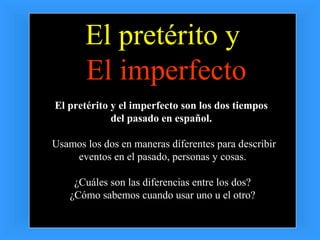
Preterite vs. Imperfect
- 1. El pretérito y El imperfecto El pretérito y el imperfecto son los dos tiempos del pasado en español. Usamos los dos en maneras diferentes para describir eventos en el pasado, personas y cosas. ¿Cuáles son las diferencias entre los dos? ¿Cómo sabemos cuando usar uno u el otro?
- 2. Las conjugaciones El pretérito Hay muchos verbos irregulares en el pretérito – mirad vuestros libros y hojas Verbos regulares siguen estas pautas (patterns): (-ar verbs) (-er/-ir verbs) -é -amos -í -imos -aste -asteis -iste -isteis -ó -aron -ió -ieron
- 3. El imperfecto Hay solamente 3 verbos irregulars (ser, ir, ver) Los regulares del imperfecto tienen las siguientes terminaciones: (-ar verbs) (-er/-ir verbs) -aba -ábamos -ía -íamos -abas -abais -ías -íais -aba -aban -ía -ían
- 4. Los usos del pretérito Completed actions (a definite ending in the past) BOOM! – it happened, it’s done! Por ejemplo: Ayer yo fui a la biblioteca. Interrupted actions (interrupts the imperfect setting the scene; “cuando”) BOOM! while something else was being described Por ejemplo: Los chicos hablaban cuando entré en la biblioteca. Sequence of events (action moves the story forward) BOOM! – it happened, something else happened, then something else happened Por ejemplo: Ayer yo fui a la biblioteca, estudié español, comí la cena, y miré la televisión.
- 5. El imperfecto La hora / La fecha / El tiempo / La estación Por ejemplo: Era jueves, el 5 de junio. Eran las siete de la noche. Era la primavera, pero hacía frío y estaba nublado. La edad Por ejemplo: En 1929, mi abuelo tenía dos años. Descripción física, del personaje, o del lugar Por ejemplo: Mi familia era alta y cariñosa. Estábamos en la playa. Las emociones / Las condiciones Por ejemplo: Verónica estaba triste. Tenía hambre y no había comida. Acciones habituales / Acciones repetidas (customary, repeated, or without a definite ending; “siempre, todo(a,os,as), nunca, muchas veces,” etc.) Por ejemplo: Cada verano pasábamos las vacaciones en Florida.
- 6. El imperfecto (a continuación) Acciones simultáneas (actions in progress; “mientras”) Por ejemplo: Mi padre cocinaba la cena mientras yo hacía la tarea. La escena (setting the scene, interrupted by an action in the preterite) Por ejemplo: Mis padres hablaban cuando yo llegué a casa.
- 7. Some verbs have different meanings in the preterite and in the imperfect: El pretérito saber conocer querer no querer poder no poder tener ir a found out met tried refused managed tried (but failed) got/received went to… El imperfecto knew (facts, information, etc.) knew (was familiar with, people, etc.) wanted didn’t want to was able to was not able to had was going to (do something)
- 8. A few notable thoughts: The preterite and the imperfect are both used to express actions and situations in the past. However, the imperfect is used when the focus is on the action being in progress. The preterite is used when the focus is on the completion of the action. “Ella visitaba el museo.” -The focus is on the fact that she was visiting the museum. This sentence does not tell us what happened in the story, only that she was visiting the museum at a time in the past. This sentence also leaves the reader/listener wanting more information. Without it, this is a dull and incomplete idea. The imperfect leaves the reader/listener wanting more information. The preterite will move the story forward.
- 9. The preterite tells you about an action that started and ended at a definite time. Viajé a Costa Rica el verano pasado. I traveled to Costa Rica last year. Viví en España un año. I lived in Spain one year. Comieron una pizza anoche. They ate a pizza last night.
- 10. The imperfect tells about past actions without saying when they begin or end. Todo el mundo dormía. Everybody was sleeping. La chica cantaba. “Was+ing and Were+ing” The girl was singing. Mi padre trabajaba en el banco todos los días. My father worked in the bank everyday. Other Imperfect uses: The sentences don’t tell you when the action started and ended. Also, with age, time, weather, and background events of a story.
- 11. For both the imperfect and preterite tenses, there are trigger words. Here are some common trigger words fo the imperfect and preterite El Pretérito Anoche, ayer, el otro día, anteayer, el año pasado, el mes pasado….. El imperfecto: Siempre, a menudo, por lo general, usualmente, algunas veces, a veces, todos los días…..
- 12. Práctica 1. A las dos anoche mi hermana (cenó, cenaba) con una amiga. 2. Los hombres (miraron, miraban) una película. 3. Ayer yo (hice, hacía) la tarea a las cinco por la noche. 4. Nosotros (bailamos, bailábamos) en la discoteca Mariela todos los viernes. 5. Mi abuela siempre(trepó, trepaba) a los árboles. 6. Tú (tuviste, tenías) catorce años cuando eras el mejor jugador de baloncesto.
- 13. ¡Práctica! 1. 2. 3. 4. 5. 6. 7. 8. 9. 10. Cuando yo (era/fui) niña, saltaba la cuerda. Anoche mis amigos (salían, salieron) por las calles. Mi padre siempre (miraba, miró) la televisión. Yo (era/ fui) a la tienda tres veces ayer. La chica (tenía/ tuvo) trece años. Nosotros (hacíamos/ hicimos) la tarea el otro día. Mi maestro nos (gritaba/ gritó) a veces. Mi familia (veía/ vio) películas todos los jueves. El año pasado yo (estudiaba/ estudié) mucho. Ellos (estaban/ estuvieron) enojados con los resultados.
